The Lavin Agency Speakers Bureau
A speakers bureau that represents the best original thinkers,
writers, and doers for speaking engagements.
A speakers bureau that represents the best original thinkers,
writers, and doers for speaking engagements.
Art is a weapon. Photos can change society—our view of ourselves and our communities.
One of the nation’s most acclaimed photographers, LaToya Ruby Frazier reveals the stark reality of today’s America: post-industrial cities riven by poverty, racism, healthcare inequality, and environmental toxicity. Legendary art critic Jerry Saltz calls her “one of the strongest artists to emerge in this country this century.” She was named to the TIME100 for her powerful art—TIME calls her “an eloquent storyteller, making visible the landscapes and lives of working people” and says that her images “pierce our complacency and demand that we pay attention to the world around us with intention and compassion.” The Museum of Modern Art (MoMA) is dedicating a massive, celebratory, and highly-anticipated solo show to LaToya’s storied career. By featuring voices and perspectives traditionally erased from the American narrative, MacArthur “Genius” LaToya not only captures our cultural blind spots—she teaches us how art is a powerful tool for social transformation.
For over two decades, LaToya Ruby Frazier has used photography and her art to preserve forgotten narratives of labor, gender, and race. Her brilliant, eye-opening work explores the post-industrial era, lifting up marginalized voices and the underrecognized work of women and people of color.
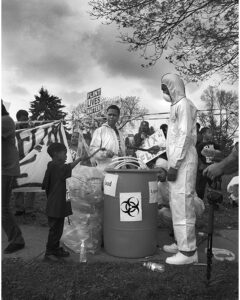
LaToya’s extraordinary body of work includes Flint Is Family: a piercing chronicle of the water crisis in Flint, Michigan. LaToya spent five years in a city plagued by poisonous water, documenting the community’s resilience in the face of environmental racism. The original photo essay, for Elle Magazine, was named one of the “25 Most Influential Works of American Protest Art Since World War II” by The New York Times, which called it “a natural extension of her already well-established commitment to social justice.” She collaborated with residents to tell their story and raise funds for a solution, as the project evolved from a photo essay to a video, and now to a 2022 book and exhibition—which celebrate togetherness and family as much as they condemn injustice.
LaToya’s recent work includes The Last Cruze, which documents the devastation of a factory town losing its factory. Designed to resemble a production line, the exhibition follows the workers affected by a General Motors plant shutdown in Lordstown, Ohio, after more than half a century of operation. These unflinching photographs of an exploited working class “speak to the imperative to stay together even and especially when driven apart” (Artforum). LaToya also took portraits of Breonna Taylor’s family for the cover story of Vanity Fair. Alongside the latter project, LaToya penned a moving statement about how crucial it was for her to help the family reclaim visual justice by offering humane and dignified representations of Breonna and her loved ones. “My portraits are a call for justice and the unwavering steadfast endurance of Black women in America regardless of the persecution we face on a daily basis,” she wrote.
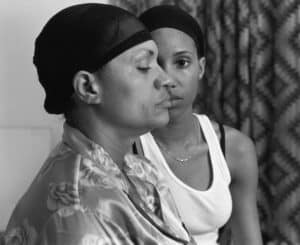
In her award-winning first book The Notion of Family, LaToya offers a penetrating look at “the legacy of racism and economic decline in America’s small towns.” A haunting photographic account of three generations of Frazier women, the book is simultaneously personal and political: investigating the impact of deindustrialization on working class Black families in the Rust Belt through the “labour-consumed bodies” of her relatives. Her talks, like her breathtaking work, betray a sobering reality: the American dream has not, and does not, work for Black people. As long as environmental injustice, healthcare inequality, and economic racism continue to thrive, the country is failing its Black citizens. With clarity and insight, LaToya shines a light on how art can be used as a tool for transformation and social good across the nation.
In 2020, LaToya was selected as one of nine Storytelling Fellows for National Geographic. She has received the prestigious MacArthur “Genius” Fellowship and the John Simon Guggenheim Memorial Foundation Fellowship. She was chosen by Ebony as one of their 100+ Most Powerful Women of All Time. Her work has been exhibited widely, with solo exhibitions at the Brooklyn Museum, Seattle Art Museum, the Institute of Contemporary Art in Boston and the Contemporary Arts Museum Houston. LaToya also shot an aerial photography series depicting Memphis, Baltimore, and Chicago in The Atlantic’s Martin Luther King issue, as well as the movie posters for the Grand Prix-winning Spike Lee film BlacKkKlansman, which tells the true story of an American detective who infiltrated the Colorado Springs KKK. LaToya is the Associate Professor, Photography, at School of the Art Institute of Chicago, and has previously held academic and curatorial positions at Yale University School of Art, Rutgers University, and Syracuse University.
LaToya was incredible! She was an excellent and generous guest speaker. Our college’s Dean described her as revelatory — and I think everyone I spoke to about the event would agree. I really can’t say enough how much we appreciated the time and energy she put towards that talk. We really are so glad it could happen!
Carnegie Mellon UniversityLaToya was fantastic! So well received and moved so very many people. The fireside chat really allowed us to open the floor for LaToya to speak openly and freely from her own experiences and observations, providing a point of view that many probably have not considered or had an opportunity to hear on their own.
VansLaToya's lecture was fantastic on all levels. She used her artwork to illustrate a narrative that was engaging and incorporated her personal artistic journey within the broader context of her work. We were very happy that she included the photograph recently acquired by our museum within her lecture. The Q&A at the end of the lecture was inspiring.
San Antonio Museum of ArtPulitzer Prize-winning author of On Juneteenth Harvard Law professor MacArthur Genius
Cognitive Scientist Expert in the Fields of Language and Cognition
Social justice comedian Director of The Muslims Are Coming! Author of How to Make White People Laugh
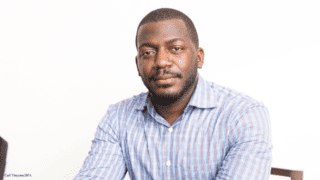
Author of The State Must Provide: The Definitive History of Racial Inequality in American Higher Education Staff Writer at The Atlantic
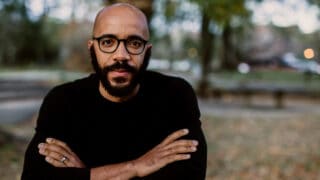
#1 New York Times Bestselling Author of How the Word Is Passed and Above Ground Atlantic Staff Writer
Author of Living in Data Former Library of Congress Innovator in Residence Former NYT Data Artist-in-Residence

Founder of Street Symphony Co-Founder of the Skid Row Arts Alliance MacArthur Genius
Pulitzer Prize-winning author of On Juneteenth Harvard Law professor MacArthur Genius
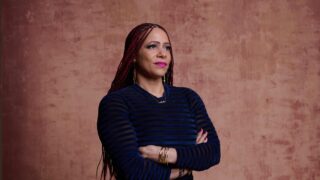
Pulitzer Prize-Winning Creator of The 1619 Project Executive Producer of the Emmy Award-Winning 1619 Project Hulu Docuseries MacArthur Genius

Author of Grit, the #1 New York Times Bestseller | Pioneering Researcher on Grit, Perseverance, and the Science of Success

Pulitzer Prize-Winning Creator of The 1619 Project | Executive Producer of the Emmy Award-Winning 1619 Project Hulu Docuseries | MacArthur Genius
Nike's Former Chief Marketing Officer | Author of Emotion by Design

New York Times Bestselling Author Of All Boys Aren’t Blue and We Are Not Broken | Emmy Nominee | LGBTQIA+ Activist
CEO of The Atlantic | Former Editor-in-Chief of WIRED
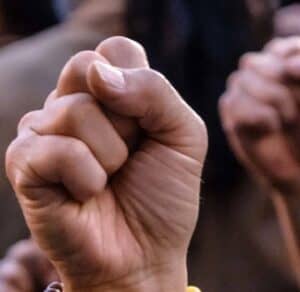
In crises and hardship, how do we come together instead of splitting apart? Award-winning photographer LaToya Ruby Frazier grew up in a town troubled by decades of racism and economic decline. Now, she uses her photography to promote togetherness and family while condemning injustice. Touching on themes of community, social justice, environmental racism, and solidarity, LaToya’s work is inspiring and incredibly relevant today.
In this revelatory talk, LaToya will go over her incredible 22-year art-making career. Her critical eye-opening photography revives conversation on pressing social and political issues and the forgotten narratives of labor, gender, and race in the post-industrial era. Drawing on her ground-breaking social documentary work, LaToya shows us how to build trust and connection, empowering us to act for justice.
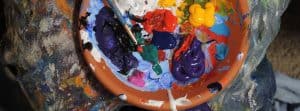
Each day, we’re bombarded by images: on billboards, on screens, in schools and in our bedrooms. And these images, largely corporate in origin, carry power—power to shape, control, and constrain—even when they offer a fantasy, or an outright lie.
That’s why, as LaToya Ruby Frazier argues, photography is a battleground of representation. We cannot control the material circumstances of our birth, our families or our economic circumstances. But in order to change society—to seed real change and cultural transformation, especially for the marginalized and the forgotten—we must change the picture we have of ourselves and our communities.
In this talk, LaToya discusses how she has used photography to fight injustice—poverty, healthcare and gender inequality, environmental contamination, racism, and more—and create a more representative self-portrait. Drawing from her book The Notion of Family as well as from works of art by Frederick Douglass, August Sander, Julia Margaret Cameron, and Langston Hughes, she relates her conscious approach to photography, opens up more authentic ways to talk about family, inheritance, and place, and celebrates the inspirational, transformative power of images.

In this keynote, LaToya Ruby Frazier discusses the value of collaboration—with individuals, families, and communities—to create a powerful platform for social change. Today, mass media dictates the dominant narrative, often silencing vulnerable communities and perspectives. Parallel realities and experiences can be found across poor and working-class America—urban decay, white flight, economic stagnation, crime, illness, and unraveling civic connections—and these can make for a bleak vision of the country. However, there are ways to engage marginalized groups and individuals to amplify their voices, and come together with renewed agency. With references to art, activism, and grassroots political action, this keynote inspires audiences to use digital technology and storytelling together in order to foster greater empathy, connection, and understanding.